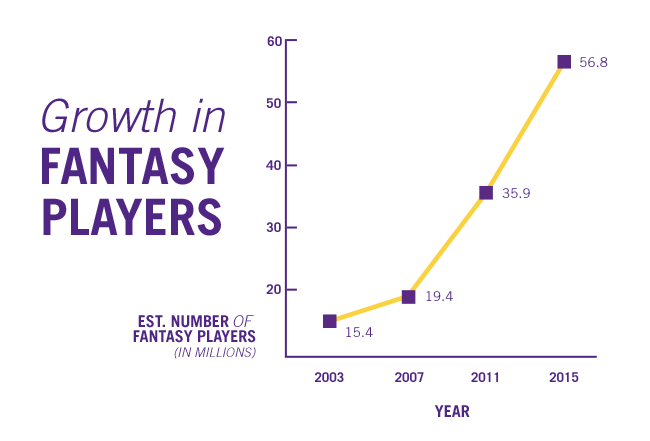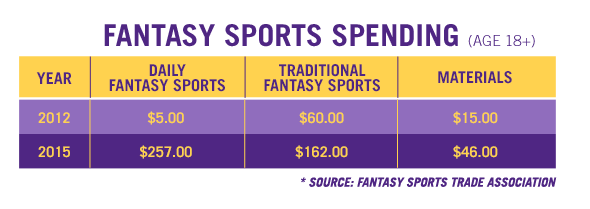Dollars for Drafts: Exploring the Business Behind Fantasy Sports
In 2015, there were 56.8 million people playing fantasy sports in the United States and Canada, according to the Fantasy Sports Trade Association. So if you are not playing fantasy sports, you almost certainly know someone who is. Fantasy sports have spread across all sports and are evolving at a rapid rate.

What has driven this immense growth of fantasy sports? How is this growing field affecting the larger sports business landscape? And how can sports professionals become involved in the booming business behind fantasy sports?
The Birth of Fantasy Sports
The dictionary definition of a fantasy sport is “any sports competition with imaginary teams which the participants own, manage, and coach and with the games based on statistics generated by actual players or teams of a professional sport.” While the vast majority of fantasy sports players today use the Internet to organize and run their teams, the first fantasy sports competitions involved pen, paper and the scores from a newspaper.
Early History
According to Sports on Earth, the roots of the fantasy sports played today were developed by Wilfred “Bill” Winkenbach in the 1960s. Winkenbach had been playing an early precursor to fantasy golf throughout the 1950s, but launched the first fantasy football league in his native Oakland called the Greater Oakland Professional Pigskin Prognosticators League. Winkenbach was at one time a part owner of the Oakland Raiders, and word spread about the league. By the 1970s, the game was making appearances in newspapers across the country.
Emergence of Rotisserie
A massive leap in fantasy sports occurred in 1979, when writer Daniel Okrent devised what would become the fantasy baseball format used by many today. Okrent and the nine friends who joined the first iteration of the league met at a French restaurant in Manhattan called La Rotisserie Françoise, which is how the name “rotisserie baseball” was born. Okrent’s league was also the first on record that used an auction draft format.
In 1980, The New York Times wrote about the league, which helped boost the popularity of fantasy baseball. The trend increased throughout the 1980s with the publication of a rotisserie league guidebook in 1984. By 1992, USA Today began a weekly column on fantasy baseball. The newspaper was already considered a top source for players thanks to its full box scores published daily.
The Internet Boom
A huge reason why fantasy sports have grown so much in popularity is because of the Internet. The easy access to news, sports statistics and tools to organize competition made the barrier to entry far lower. Throughout the 1990s, fantasy sports began to migrate online through various websites and news outlets.
One of the first big players was Commissioner.com. It launched in 1997 and was a fantasy commissioner service via subscription, first for baseball and then for other sports. The site was then sold to SportsLine. When CBS purchased SportsLine in 2004, Commissioner.com became the fantasy sports engine behind one of the largest broadcast stations.
In 1999, Yahoo became the first major company to offer fantasy sports games for free to all comers. ESPN quickly followed, and the two became among the most popular offerings. In 2002, the NFL cited the first study that proved fantasy play was driving TV ratings. The NFL began running promotional ads for fantasy football featuring current players and changed the trend of sports leagues viewing fantasy sports negatively.
By 2003, the Fantasy Sports Trade Association reported 12 million people playing fantasy football alone. These players were spending $150 a year on average, making it a $1.8 billion industry.
How Fantasy Sports Have Affected the Sports World
Today, fantasy sports and their real-life counterparts have become truly intertwined. This has led to not only the discussion of fantasy sports on broadcasts, but also to the spread of fantasy sports into every part of the sports business. These relationships are growing and evolving, and they are making a big impact on the sports world at large.
Spending on Fantasy Sports

As always, money plays a major role in driving the sports world. Citing data from the Fantasy Sports Trade Association, Forbes reported that 32 million Americans spent an average of $467 annually playing fantasy sports as of 2013. That’s $15 billion in total playing, with about $11 billion flowing toward football alone. This means that more is spent on fantasy football than the $10 billion the NFL makes in revenue.
The growing specialty of daily fantasy sports is one of the biggest examples of how fantasy sports pump money into the larger sports industry. The two largest DFS companies, FanDuel and DraftKings, spent $206 million in national television advertising from the beginning of 2015 to the end of September 2015. This was one of the highest advertising rollouts of all time, and most of these ads showed up in sports-related programming.
This money has a major effect on the operation of teams and leagues. Each of the major sports leagues offers its own fantasy solutions on its website, hoping to capitalize on the popularity. Current players are also allowed to appear in endorsements featuring fantasy sports, and the relationship between leagues and fantasy sports has been very collegial.
Media Coverage
Fantasy sports have also changed how leagues are presented, both in broadcasts and other media. Today there is an entire industry of fantasy sports media, both among outlets that already cover sports and those focused on fantasy sports alone.
ESPN, CBS and others have dedicated fantasy “experts” who cover their prospective sports in relation to fantasy sports. They have dedicated coverage on websites, with dedicated columns and reporters. There are shows that cover sports from just the fantasy angle. The NFL and DIRECTV even broadcast an entire game-watching experience ideal for fantasy football called “RedZone.”
The fantasy revolution in general has changed sports coverage, from mentions in broadcasts to the way that injuries are reported. If a sports event has a potential effect on fantasy, it will likely be mentioned and covered from that angle.
Industry Investment
The recent growth of daily fantasy sports has highlighted a trend toward industry investment. Leagues, teams and other stakeholders in the sports industry are making investment deals with fantasy sports companies. Among the major sports leagues, only the NFL has not invested in either DraftKings or FanDuel.
DraftKings has received investments from Fox, the Kraft Group (owners of the New England Patriots), Major League Baseball, the National Hockey League and Major League Soccer. FanDuel investors include NBC Sports, Turner Sports (TNT and TBS), the NBA and several team owners.
These investments are proving that sports entities want a larger portion of the fantasy pie and that they’re willing to pay big money to get it.
Future of Fantasy Sports
There is little doubt that fantasy sports are here to stay. But what role will they play in the future of the sports industry?
In-Stadium Partnerships
One issue that professional teams are having is a slight decrease in fan attendance that could be attributed to a need to follow fantasy sports more intensely. Fans want to be able to know what’s happening across the sport, and teams want to create an environment where fans can stay connected.
Many teams have cultivated in-stadium partnerships for fantasy lounges dedicated to allowing fans to both follow their teams and attend the games. Most of these fantasy lounges are dedicated to daily fantasy sports.
Legal Challenges
While daily fantasy sports continues to grow rapidly and thrive, it has begun to face legal challenges in courtrooms across America. Some states have taken up the question whether competitions taking place on sites like FanDuel and DraftKings are legal under the laws prohibiting sports gambling.
While these legal challenges are having an effect on daily fantasy, the game continues to grow. Some states have ruled in favor of the websites, and they retain their large presence across the sports business landscape. There is little doubt that daily fantasy is here to stay.
Understanding the Sports Industry
As the sports industry continues to grow, driven in part by the popularity of fantasy sports, job seekers have more opportunity. At Concordia University Texas, students in the online sports administration program learn the fundamentals of the business of sports. From marketing to management, our program is designed to help give you the skills and credentials you need to enter this exciting and rewarding field. Turn your passion for sports into a career by learning more about our Master of Education in Sports Administration degree.
